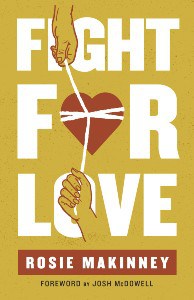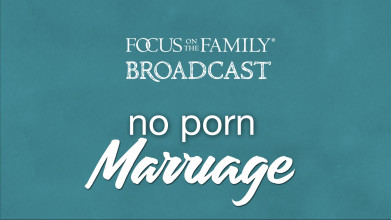John Fuller: Today on Focus on the Family, we’re going to address an evil that destroys far too many marriages and families, and it’s a sensitive, serious topic and it’s not appropriate for younger children.
Woman #1: Someone told me if I loved my husband enough, he would stop using porn.
Woman #2: When I confronted him, he said he was done, and we tried to get help again and again and again.
Man #1: I was devastated when I discovered that my daughter was addicted to illicit websites.
Woman #3: He chose porn over me. He will always choose porn over me.
Jim Daly: John, those comments represent the heartbreak we hear from so many couples today, um, here at Focus on the Family. We receive about 2000 responses a day from people. It’s of all different types and nature. But certainly, this topic of pornography is one of the leaders. Uh, pornography is an unwelcome guest to any marriage, because it will destroy that marriage. It all has complicating aspects to it. It destroys intimacy, it widens secrecy, it makes you not trust one another. And that is horrific in a marriage. Porn’s a poison that destroys anyone who uses it. We need to think about that. The data is astonishing to me. And that’s why we’re covering it, John. When you look at the number of both men and women who are using porn today, uh, it is catastrophic. And here at Focus on the Family, we want you to have the best marriage you could possibly have. And if you’re in that camp, where you’re using pornography, that is not healthy for your marriage.
John: Mm-hmm. Yeah. And we’re here to help. Give us a call, talk it through, bring light to that dark part of your, your life, your soul. Our number is 800, the letter A, and the word FAMILY. 800-232-6459, or stop by focusonthefamily.com/broadcast.
Jim: And of course, as I said, uh, you know pornography is gender neutral. But far more men use pornography than women. On day two, we’re going to talk about the use by women. But don’t feel like we’re excluding, uh, women from that discussion. But most of the conversation will be geared toward the wives whose husbands are using pornography. And we have a great guest who is gonna be with us to talk about this issue. Her name is Rosie Makinney. She’s written a wonderful book, Fight for Love. And her own experience is going to explain the path forward for couples who are caught in this travesty. Rosie, welcome to Focus on the Family.
Rosie Makinney: Thank you for having me. It’s a, it’s a great honor to be here.
Jim: Now, I noticed that accent so you’re from England.
Rosie: I’m from England from Yorkshire.
Jim: Yorkshire, you just love saying that-
Rosie: I do. I’m very proud.
John: (Laughs).
Jim: And… But you’re living now in the last 13 years or so in the US in California. Correct?
Rosie: Yes, on the central coast of California.
Jim: And tell me about your family.
Rosie: I’m, I’m married to my husband, Mark. And we have two boys who are now nine and 11. And I’m attempting to homeschool them.
Jim: Well, let’s start, uh, with a question we received from a woman, a listener to Focus on the Family. And then I want you to respond to this. She said, “My husband cannot go one day without looking at pornography. I told him it’s an addiction and he needs help. He refuses to get any help because he is ashamed. I don’t want it in my marriage or our family. We have teenagers, and I’m afraid they’ll find it and think it’s alright. This could be the end of our marriage if we can’t find a solution. Do you have any suggestions?” Now this came to us, of course, we responded. But how would you respond to that?
Rosie: I think first of all, I would validate that wife’s instincts and tell her that she is, um, listening very well to what the Holy Spirit is telling her. And that this is a problem if he can’t go a day without looking at this. This is as she rightly said, this is an addiction. And she recognizes that. Um, she’s wanted him to get help it sounds like. But he’s refusing to get help. And she’s worried that her marriage may end as a result of this, like it’s going to get progressively worse.
Jim: Mm-hmm.
Rosie: And she’s probably right. However, I do have great hope for her because, um, for her to get to the point where she’s actually reaching out to you guys, I would suspect that she’s been in pain for a very long time.
Jim: Hmm.
Rosie: And she’s felt isolated and ashamed and hopeless and helpless. And, uh, she’s probably tried many, many things to fight for this marriage already. I would from all the wives I’ve worked with, and the wives in my community, I would say that she’s probably tried the things she’s heard like, just be more sexual with him, just be more graceful with him, be more forgiving, create a loving environment so he doesn’t need to… He doesn’t feel like he has to do this. She’s probably tried that again and again, going against her own intuition, against her own feelings. Um, and, uh, but what I would say to her is, you haven’t done the one thing that actually works, because the problem as far as I see it, is that she needs her husband to get into recovery. But she doesn’t know how to do that because he won’t reach out for help.
Jim: Right.
Rosie: And this is… And what I’m gonna to say now is so simple and it makes so much sense. But yet, for some reason, we’re not quite getting there, yet. And that is what is the reason that most married men get into recovery. You know, do they suddenly feel convicted one day? Some maybe, a small minority, but what actually gets guys into that therapist office is their wife forcing the issue.
John: Hmm.
Jim: Not accommodating but forcing it.
Rosie: But forcing. And-
Jim: Yeah.
Rosie: … there is something tremendously painful about a wife being brought to a place of desperation and pain, where she has to force this issue. And so, my whole heart, my whole passion is to tell women that they don’t have to wait. You do not have to wait till your marriage is on the verge of a divorce, till you’re on the verge of a nervous breakdown, you can actually take proactive action right now-
Jim: Yeah.
Rosie: … if you know or suspect that pornography is an issue in your marriage, there are things you can do now to help bring him to repentance.
John: Hmm.
Rosie: It isn’t you that’s gonna bring him to repentance. It’s following God, it’s by being obedient to God. And that’s where I get tremendously excited, because he’s already provided the answer for us in the scripture, we just have to look at what it says.
Jim: Right. And in that respect, I mean, that’s part of your story, we’re gonna unfold that today and tomorrow, I want to, uh, talk at that higher kind of elevation. Give us the statistical information. I mean, what does it look like in culture, uh, with the church and outside the church?
Rosie: Okay. Well, we’re very fortunate in that Josh McDowell did a massive study, quite recently, where he spent like $300,000 to get the data that we so desperately need. And he found out that of guys who, um, evangelical guys who regularly attend church, 79% are regularly using pornography.
John: Hmm.
Jim: That’s… I mean, that seems unbelievable.
Rosie: It’s, it is shocking.
Jim: Now, that’s everybody that’s married and single.
Rosie: That’s married and single.
Jim: Break it down a little bit between those.
Rosie: Married, married guys, it’s 55%.
Jim: Hmm.
Rosie: That’s over half of marriages are struggling with this.
Jim: And these are people who are going to church regularly.
Rosie: Yeah. Yeah.
Jim: Not just the general constituency.
Rosie: Yeah.
Jim: What does that number look like for the general population?
Rosie: It is, it’s not that dissimilar.
Jim: Okay.
Rosie: It might be a little bit higher, but it’s not-
Jim: Hmm.
Rosie: … that different.
Jim: So, 78% of men, uh, in general-
Rosie: Yeah.
Jim: … and in the church-
Rosie: Yeah.
Jim: And then about 55% of married men-
Rosie: Yes.
Jim: … use it. And define regularly.
Rosie: At least once a month.
Jim: At least once a month.
Rosie: That-
Jim: And this is actual-
Rosie: That was the criteria they used.
Jim: … Actually, going to-
Rosie: Yeah, deli-
Jim: … the website or something, it’s not just seeing a movie that’s a little-
Rosie: No.
Jim: Risqué or-
Rosie: It’s-
Jim: … catches you off guard.
Rosie: … deliberately seeking out alluring material for the purposes of arousal.
Jim: Okay.
Rosie: Deliberately doing that.
Jim: And it’s such a hard subject such a difficult subject, and, uh, one of the things that people will begin to justify is, is it that bad? It’s just a little, uh, assistance, it helps me, it entices a little arousal in our marriage. And it’s, it’s healthy. I mean, you can hear the explanation there.
Rosie: Yeah.
Jim: And you’ve heard that from people. Speak to the wider damage that we opened the broadcast with, you know, the impact to a marriage because of pornography.
Rosie: Yeah. There are so many studies now. We’re talking hundreds of studies that prove that pornography damages relationship. It’s like, I use the analogy, do you, do you know the story of the Snow Queen?
Jim: No.
Rosie: Okay, so it’s a fairy tale by Hans Christian Andersen. And, um, basically, there’s a, an evil troll who creates a mirror, and the mirror shatters, and it goes throughout the world, and it gets into people’s eyes. And when they look through this, uh, mirror that’s now lodged in their eye, they only see the bad and ugly in people. And this is what pornography does, it puts this pornographic lens, so you are no longer able to see your spouse in the way that you once did, in the way that God intended you to, you will be more dissatisfied with their appearance, with their sexual performance. And also, just general decision making.
Jim: Hmm.
Rosie: It is this pornographic lens.
Jim: Hmm.
Rosie: And that’s what we women need to hear.
Jim: Yeah.
Rosie: We need to have it validated because we know it, we know-
Jim: Mm-hmm.
Rosie: … something’s changed. We know they’re not there. We feel it on a, on a gut level. And it doesn’t matter what we try, it doesn’t make any difference.
Jim: Well, this term that is used that many people I don’t believe understand when we talk about objectifying women-
Rosie: Mm-hmm.
Jim: That’s what you’re describing that they became-
Rosie: Totally.
Jim: They become less than your partner, less than your wife, less than-
Rosie: Yeah.
Jim: And you, you begin to see them in, only in ways that they can satisfy you.
Rosie: Exactly. Because we know that what you watch affects how you think about things, we have what? A billion-dollar marketing industry, we know that it affects. It’s the same with pornography, and you’re not watching two consensual adults having sex, you are watching something that is highly violent, misogynistic, degrading, humiliating. That’s what pornography is. And for those of us who grew up before the internet, and haven’t been exposed to it, it comes as a big shock, they’re watching what?
Jim: Yeah.
Rosie: And I’m not gonna go into graphic detail.
Jim: Yeah, of course.
Rosie: What is sort of very, very common and ubiquitous in most of the pornography videos, but it’s highly shocking and highly dehumanizing.
Jim: Right.
Rosie: That is what you are being exposed to. And your brain is being conditioned to be aroused by what you’re watching.
Jim: And that’s what I wanted to ask you is the brain science, that was the next question I had for you. In Fight for Love, your, your wonderful, tough book, uh, you describe that brain science related pornography, explain how, uh, porn can essentially hijack the pleasure center of your brain.
Rosie: Yeah. This is fascinating. And when I discovered this, it was like, so many light bulbs went on in my head, um, and helped me see my husband as not my adversary anymore, but an ally who needed help, he really needed help. Once I understood what was happening in his brain, or what had happened in his brain, I, I had compassion I didn’t have before. It doesn’t excuse what he did, but it, it helps. So basically, the reward center of your brain gets hijacked. So, the reward center is basically a biological way of maintaining our survival. So, whenever we do an activity that furthers our survival like eating or having sex, then our brain produces chemicals that reward us, happy chemicals, okay? The… Which is very good. We, you know. We… It says-
Jim: Right.
Rosie: That was an advantageous behavior, let’s repeat that. Unfortunately, with pornography, it can be hijacked, we can be hijacked by artificial stimulus, that actually is a, it’s called a super normal stimulus, which means that we can be conditioned to actually prefer these false images.
Jim: Hmm.
Rosie: And the thing that’s difference between, uh, a normal, intimate sexual relation, you know, encounter with your spouse and pornography, is that in this one, when you’re, when you have sex with your spouse, there’s an off switch. You know, just like when you have too much food, there’s an off switch. It means you can get out of the bedroom, you know, out of the dining room and get back on with your life. With pornography, there is no off switch.
Jim: Huh! So, that’s the addictive factor.
Rosie: There is no off switch. So, you can literally binge for days, because all you need, the only thing you need to do to keep this dopamine surging is to click on something novel, something new, something more stimulating, maybe more shocking, you need to up the ante.
Jim: Hmm.
Rosie: And you can get another hit. And this is how people get so addicted because your brain, um, when we do repeated activity, we create neural pathways. Yeah. And that helps us do things quicker.
Jim: Hmm.
Rosie: Like then to drive, playing the piano. So, what’s happening in your brain when you’re watching pornography is that you’re, you are creating these neural pathways connecting pleasure and the activity of pornography. And the high that you get from pornography, nothing else really counts. And this is why you see people who are addicted, you know, their hob… You know, just not interested in their hobbies anymore. Fulfillment at work, no longer does it, you’re dissatisfied with your spouse, um, hanging out with your kids just irritates you. Everything in life becomes lackluster-
Jim: Hmm.
Rosie: … because nothing else can compare.
Jim: Yeah. Right. In fact, you, you relate in the book, uh, people addicted to pornography are similar to head trauma-
Rosie: Yeah.
Jim: … patients. Describe that analogy, because that’s fascinating.
Rosie: Is it not wild?
Jim: Yeah.
Rosie: Well, this is interesting in the fact that there’s a condition called hypo frontality, that you get in two ways. You get it from heavy porn use, or a head on collision.
Jim: Huh!
Rosie: And this basically impacts the functionality of your prefrontal cortex, which is your decision-making part of your brain. It helps you weigh consequences and make good decisions. Okay. It also shrinks your gray matter, literally shrinks your gray matter. So, you know, wives often say to me, “He knows I hate this, you know, how can he keep doing this? It’s damaging our relationship. It’s breaking my heart. It’s ripping the family apart. Why, why can’t he stop?” And the point is, his brain has been hijacked in so many ways, like he’s no longer able to feel happy, he needs his drug, his drug is no longer effective. And he’s got this condition where his brain is no longer connecting very well in the decision-making parts-
Jim: Hmm.
Rosie: And, uh, he, he’s not able to reach out because he can’t override the cravings. And the cravings are coming because the brain has now been sensitized to all these pornographic cues out there that…Oh, pornographic cue, oh, that’s highly pleasurable, oh, I need to do that, decision making part of my brain is no longer functioning. It is literally a spiral.
Jim: Yeah.
Rosie: And I say all this not to terrify women and make them feel hopeless. But to make them understand that waiting for your guy to reach out for help is probably not a good strategy.
Jim: Right.
Rosie: And that’s my whole point. However, there are two people in the marriage, when to become one. Okay? You are the functioning part of the brain now.
John: Mm-hmm.
Rosie: Okay? What is affecting him is affecting you. It’s not just his problem, it’s your problem. And you can effect change, you can be the catalyst, you can draw a firm line in the sand, and reach down and grab him out of the swamp, cause he can do it.
Jim: Hmm.
John: Our guest today on Focus on the Family is Rosie Makinney. And you can hear the passion that she has to help in the situation. Her, her book is called Fight for Love, call us for a copy or to talk to one of our counselors, we’ll schedule a time for you to do that. Our number is 800, the letter A, and the word FAMILY, or stop by focusonthefamily.com/broadcast. Uh, the book Fight for Love and I will encourage you to look for your copy locally as you can.
Jim: Rosie, let’s get into your story, cause I think it’ll be very instructive for the listeners, the viewers, um, you and Mark met. Uh, describe that, and then what took place rather quickly, even on your honeymoon that gave you concern?
Rosie: So, I, when I met Mark, um, I had already prior to becoming a Christian, prior to meeting Mark, I had already been in a long-term relationship with an unrepentant porn addict. So, I’d already done this journey. And I knew that nothing I did was going to work. So, I had that experience. So, I met Mark, lovely Mark. Um, and he, um, confesses that this has been a problem in the past. And in my naivety, I’m like, “Ah, he’s confessed.” He said he’s worked on this in the past, he doesn’t want this-
Jim: Hmm.
Rosie: I’ve got one of the good guys, you know? This is not gonna be an issue. You know, we’re gonna get married and everything is gonna be fine. And then from honeymoon onwards, it’s very clear that this is not-
Jim: Mm-hmm.
Rosie: … gonna be okay. And something rose up in me. I went, “No, I’m not doing this again.” I know that there is nothing I can do-
Jim: Hmm.
Rosie: … that is going to make this better. He needs help. He needs help. And so, I said to him, “I, I love you, and I love us too much, but you need help, because you can have pornography, or you can have me. But you cannot have both.”
Jim: Mm-hmm.
Rosie: And the only reason I was able to do that, not because I had great self-esteem, or that I knew what I was talking about. I didn’t know any of the brain chemistry and that was the right thing to do. It was only because I’d had the prior experience.
Jim: Yeah. And then in your situation, Mark responded well, he wanted to get help, I believe.
Rosie: Yeah.
Jim: So that was a good response. Not everybody will get that response.
Rosie: Yeah.
Jim: So again, speak to your experience of how, uh, favorably Mark responded. And then maybe contrast that with other women that you’ve counseled where their husbands have said, “Hey, it’s not my problem, it’s your problem.”
Rosie: Yeah.
Jim: I mean, something
Rosie: Oh, totally. And even though he responded well, he wasn’t happy about it.
Jim: Hmm.
Rosie: And he was still in crazy addict brain. And it was really hard. It’s really, really, really hard to stand firm.
Jim: Yeah.
Rosie: And that is why you need to be educated. You need support, you need people around you to validate the trauma that you’re going through, and have been through, um, in order for you to stand firm.
Jim: Yeah.
Rosie: I mean, that is the whole, the whole biblical thing isn’t it just stand. Stand.
Jim: Yeah, Rosie, I’m thinking of that first… You know, the, I’m sure that wife has that inclination that fifth, sixth sense that something’s not right.
Rosie: Yeah.
Jim: Or it’s blatantly obvious.
Rosie: Yeah.
Jim: Like in your case, you knew it because you had experienced that before. Many women I would think, then begin to go over their options in their own mind and their own heart. Is this marriage worth it? Uh, you know, as he violated the marriage vow.
Rosie: Mm-hmm.
Jim: I mean, those are valid questions.
Rosie: Mm-hmm.
Jim: People may have different theological, uh, understandings of what they’re able to do, but speak to that immediate response. And what you went through personally as part of your restorative approach.
Rosie: okay. Part of the problem of being the spouse, or the partner of someone who is addicted to pornography, is that you are second guessing yourself all the time.
Jim: Yeah.
Rosie: Because you hear it in the world, pornography is healthy for relationships, it’s beneficial, um, it’s empowering and liberating for women. Um, and then you maybe go to the church, and they say, “Well, you can help him with his temptations if you make yourself more sexually available.” Um, even though your heart’s going, “Oh, doesn’t feel right. I don’t want to do that. I certainly don’t want to do the things that he wants me to do. Or, actually, he’s been neglecting me for months, that can’t be the issue.” You’re so confused. And you look at your options. So, is one option is like, “Well, I’m gonna compete with the pornography. I am going to, um, be… I’m gonna fulfill all his sexual fantasies. I’m gonna be available.” Um, or you might go, “Okay, I’m gonna be totally graceful about this whole thing. And I understand, uh, that, you know, this is a ubiquitous temptation, and that everybody does it. And I’m going to be, um, I’m just gonna, you know, forgive him. And I’m gonna dig into that. And I’m gonna just rely on my faith. And this is hard. And that suffering is part of being a Christian. And that I’ve just got to put up with it.”
Jim: Almost like accepting it all.
Rosie: Yeah, totally.
Jim: And that’s not the healthy way to go.
Rosie: No. Or the other way is, I just need to get over myself, I need to get over myself, and then I’ll be able to feel close to him. But here’s the thing, you’re never going to be okay with pornography, A, because it’s demonic, and B, because the Holy Spirit is never going to let you be okay with that being brought into your relationship. The idea is not to just accommodate, is to get it out of your marriage.
Jim: I would think your, the third option is to not excuse the porn user, your-
Rosie: Exactly.
Jim: … your husband in, in the way that we’re describing it today. And again, next time, we’ll talk about-
Rosie: Yeah.
Jim: … women who are using porn as well. So, don’t, don’t write us it’s only one sided.
Rosie: Yeah.
Jim: We get it.
Rosie: Yeah.
Jim: But in that context, I want you to drill into that in these last moments-
Rosie: Okay.
Jim: That we have. The, the idea that, you know, again, don’t be overwhelmed by the justification of its use.
Rosie: Yeah.
Jim: Stand firm in what you feel the Lord saying to your heart.
Rosie: Exactly.
Jim: But that takes a lot of strength.
Rosie: It takes a tremendous amount of strength.
Jim: And you did it. So, what were those things that you did right here at the end that really got you-
Rosie: Well, I didn’t do it-
Jim: … Mark-
Rosie: … perfectly. I would advocate that women take a firm stance of zero tolerance through education and support, you know, join a group. Okay, so we talked about husbands who won’t get into recovery. That’s okay. The answer is not to stay in a, a horribly deteriorating relationship, one that’s gonna stay stagnant and intimately void, or leave. There is option C. If you won’t get help you get help. Your betrayal trauma is real, you get help, you get strengthened, you learn how to set boundaries. And the scripture is clear that to help a husband who’s being disobedient, the word is you submit to the word.
Jim: Mm-hmm.
Rosie: You keep yourself pure. And then he will be put in a place of reverential fear by your pure behavior. It’s how we get convicted. You know, my wife is making it pretty obvious that she’s not clear with this. And that conviction starts turning and turning and turning. She’s putting up boundaries. She’s serious, he needs to see that. But you can’t fake it. So, you have to edify yourself, you have to educate yourself, you have to surround yourself with women who have fought and succeeded and let me just end with this, you’re not fighting for the marriage that you had minus the pornography, you’re fighting for something new, something beyond your greatest expectations, because pornography is not the problem. Pornography is the solution to an intimacy disorder.
Jim: Hmm.
Rosie: So that’s what you’re fighting for. You’re not fighting to just get rid of this pornography, you’re fighting for this new level of vulnerability, honesty, authenticity, that you’ve never had before. And that’s exciting. That is really exciting.
Jim: Yeah.
Rosie: So…
Jim: Yeah. Rosie, I wanna make sure right at the end, we’re giving that hope, which you talked about from the moment you walked in the door here at Focus on the Family, is that I wanna be about hope. And you and Mark, just so we are clear for the listeners and the viewers, you are married and having a you know, a good journey now.
Rosie: Totally.
Jim: And that’s really important, uh, to remember. And one of the things that I’ve seen with our Hope Restored marriage intensives and other things, is if you can get through this as a couple, the level of intimacy that you share is really unique.
Rosie: Yeah.
Jim: It’s special because there’s nowhere to hide.
Rosie: No.
Jim: You-
John: Hmm.
Jim: The, the stuff is out on the table. And you know me as fully as I can be known my warts and everything. And I’m sure that’s the experience you and Mark have had now. And it’s in some ways very freeing.
Rosie: It is. It is the, the worst best gift I never thought I wanted.
Jim: The worst best gift.
Rosie: (Laughs).
Jim: I like that.
Rosie: If that makes sense.
Jim: Yeah.
Rosie: Um, it’s not just… You don’t have to take my word for it. Okay, we now have a community of many, many other women who have fought for their marriages, fought really hard, and those whose marriages didn’t survive, because I want to put this out there that, that sometimes guys do remain unrepentant. But those women have fought for their families, and they fought for their mental health, and they fought for their futures. And they now wake up in the morning-
Jim: Yeah.
Rosie: … with hope. And they wake up able to smile and laugh again. Because if you’re in a relationship with a porn addict, you’re not doing a lot of laughing and smiling and you feel horribly alone.
Jim: Mm-hmm.
Rosie: And I want to tell you, you’re not alone. There’s a whole army of women out there-
Jim: Yeah.
Rosie: … who wants to give back and wants to love on you. And, uh, you can do this upon free marriage is possible and it’s better because both of you are now naked and unashamed.
Jim: Huh.
Rosie: Both of you.
John: Hmm.
Jim: Yeah, that’s wonderfully said Rosie. And what a tremendous kickoff to this discussion, we’ll come back next time and continue cause there’s so much more to cover. And, uh, I want, I want to make sure that people understand our heart here, it’s easy to find, uh, criticism, you know, I can’t believe you’re talking about this subject. But you know, the Christian community by and large, we have given this over to the world to define, hey, our God, our creator defined what it is to have healthy intimacy, physical intimacy, within the context of marriage. That’s our definition, and we’re not ashamed of it. And we need to become healthier in the body of Christ. Fight for Love your wonderful resource, as difficult as it is, it’s a great book, and we want to make it available to you, if you make a gift of any amount to Focus, we’ll send it to you as our way of saying thank you, if you cannot afford it. And I mean it. If you can’t afford it, get a hold of us, we’re gonna trust others will do their part in ministry with us to get this out to you. And I think it’s one of the most im- important discussions we can have and one of the most important resources we could provide, especially given the statistics Rosie mentioned earlier, and this is men in the church. And we have got to do a better job if we want healthy households, if we want healthy families. It starts with leadership with men doing the right thing. So, get a hold of us. It’s not about beating you over the brow, it’s about getting healthier.
John: Hmm. Contact us today to schedule a time to talk to a counselor or to get a copy of this book, Fight for Love and to donate as you can. Our number is 800, the letter A, and the word FAMILY. 800-232-6459, or you’ll find the help you need at focusonthefamily.com/broadcast.
Jim: Rosie again, thank you and let’s come back next time.
Rosie: Sounds great.
John: Mm-hmm. And on behalf of Jim Daly and the entire team here at Focus on the Family, thanks for joining us today. I’m John Fuller, inviting you back next time as we continue the conversation and once again help you and your family thrive in Christ.























